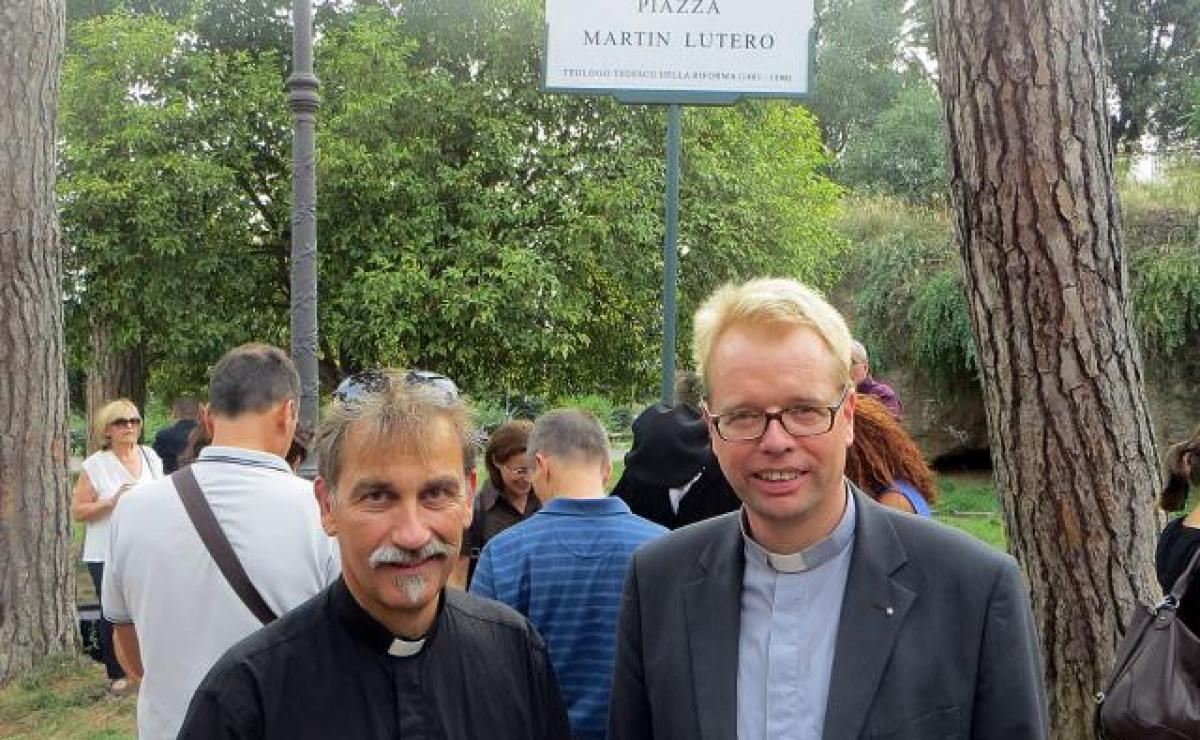Piazza Martin Lutero in Rome, a reminder to care for the poor

An important ecumenical witness for Christians
(LWI) – Rome’s new Piazza Martin Lutero is not only a sign that Lutherans are welcome in the cosmopolitan Italian city but a reminder of Luther’s call for Christians to proclaim the gospel together by serving the poor.
Rev. Jens-Martin Kruse, pastor of the German-speaking congregation of the Evangelical Lutheran Church in Italy (ELCI) made these remarks following the 16 September inauguration of a central square named after the Reformer Martin Luther. Civic and church dignitaries attended the ceremony to officially recognize the Piazza Martin Lutero, located near the historic Colosseum amphitheater.
“And at the same time this place is also a bit troubled. Here live many refugees, the homeless. For us, there is a reminder that we have an obligation to care for these people,” said Kruse, who serves about 500 Lutherans in Rome.
Piazza Martin Lutero is the result of five years of work by a group of Protestants, including Adventists, Baptists, Methodists, Waldensians and Lutherans, who collaborate in helping the city’s migrants, children and the unemployed.
They decided to lobby the local council to name a place after Martin Luther. At first there was no interest because only a few people knew who Luther was, so the group started a campaign to inform people about his life and theology.
“At the end—after a period of intense work—the council was convinced and they found a very nice central local, the Colle Oppio, where we celebrated with the mayor of Rome, Ignazo Marino, and about 500 members of our parishes at the official opening of the new Piazza Martin Lutero,” he said.
During the ceremony a plaque was unveiled reading “Piazza Martin Lutero – German Theologian (1483-1546)”.
Rev. Heiner Bludau and Rev. Jakob Betz, the dean and vice dean of the 4,000-member ELCI, said the naming of the square after Luther marks an important moment for Christianity. “It has high symbolic value and fills us with joy. And we believe that it also constitutes an ecumenical witness in the daily life of the citizens of the capital and its many visitors,” they said.
Diverse ecumenical relations
For Kruse, Piazza Martin Lutero is a significant ecumenical development, illustrating that in Rome today Lutherans and Catholics can speak together about Luther and that they can proclaim the gospel together.
“In Rome we have very good relations with the Roman Catholic Church. Rome is not only the center of the Roman Catholic Church but also a city where all the other churches have parishes, and so we have very diverse ecumenical relationships,” Kruse noted.
To commemorate the 500th anniversary of the Reformation triggered by Luther, there will be a series of ecumenical worship services, prayers and meetings in Rome in 2017. The year will also mark 200 years from the time German Lutherans first began worshipping in the city.
On 15 November this year, Pope Francis will follow in the footsteps of his two predecessors, John Paul II and Benedict XVI, and take part in an ecumenical worship service at the Lutheran church in Rome. This will give expression to the good ecumenical relations in the city, Kruse added.
“Here in Rome we live as Christians together as much as possible and our little Lutheran parish is one important element of the city’s ecumenism,” he concluded.
The Lutheran World Federation (LWF), of which ELCI is a member, will mark the 2017 Reformation anniversary in a spirit of ecumenical accountability, highlighting also the 50th anniversary of the ongoing international dialogue with the Roman Catholics.
One of the outcomes of this bilateral relationship is the publication “From Conflict to Communion” in which Lutherans and Catholics for the first time, tell the history of the Reformation together. A joint working group of Catholics and Lutherans is developing liturgy for a joint commemoration of the Reformation anniversary, and this material will also be available for use by churches.

